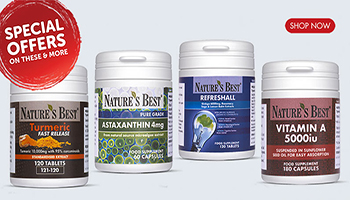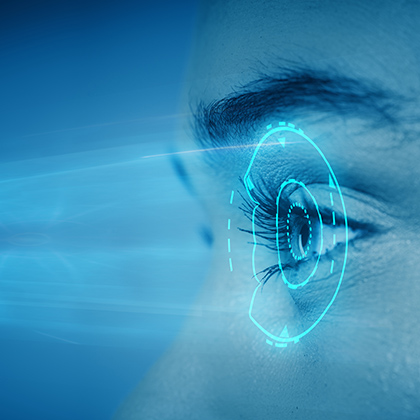
If you’ve been looking for advice on how to boost your vision, you’ll most likely have come across two key nutrients: lutein and zeaxanthin. They are natural antioxidants that belong to the carotenoid family of plant pigments called xanthophylls. They are both isomers, which mean they have the same molecular formula as each other, but with different chemical structures. The two are often found together in nature, with some plant foods rich in lutein also containing zeaxanthin, although usually in smaller amounts. To help give you a more in-depth breakdown of how the two can assist with eye health, we’ve put together this guide.
Lutein and zeaxanthin in the eye
Lutein and zeaxanthin are found in very high concentrations in the part of the eye called the macula.
The macula is a very small area within part of the eye called the retina. The retina is the light-sensitive tissue that lines the inside of the eye, with the macula found in the centre. Light reaches the macula, the part of the eye responsible for clear, detailed vision. Over time, however, the macula can deteriorate with age, causing a loss of central vision. This condition is called age-related macular degeneration (AMD) and is thought to affect around half a million people in the UK.
 The yellow pigment found in lutein and zeaxanthin is thought to protect the macula by blocking the action of potentially harmful naturally occurring substances caused by oxidation called free radicals. This protective pigment is also believed to absorb damaging high-energy blue light and ultraviolet (UV) light from the sun as well as blue light from digital screens, acting as a form of sun-protector.
The yellow pigment found in lutein and zeaxanthin is thought to protect the macula by blocking the action of potentially harmful naturally occurring substances caused by oxidation called free radicals. This protective pigment is also believed to absorb damaging high-energy blue light and ultraviolet (UV) light from the sun as well as blue light from digital screens, acting as a form of sun-protector.
Lutein and zeaxanthin: what research tells us
In recent years, there has been a wealth of research into the relationship between lutein and zeaxanthin and a number of common eye conditions. We’ve broken down some of the research to assess whether there is any validity to these claims.
Age-related macular degeneration (AMD)
A number of experts have carried out research to understand whether nutrition may help prevent it or slow down the process of AMD. One study conducted in five ophthalmology centres in the US found that introducing higher levels of carotenoids in the diet – specifically lutein and zeaxanthin – was associated with a reduced risk of AMD.i Additionally, another study found that people with AMD have lower-than-normal amounts of macular pigment, suggesting a further link between the two.ii The same report found that lutein may protect the retina against too much light. A more recent study on patients who already experienced AMD found that those taking lutein supplements for 12 months showed improvements in their vision – including an increase in their macular pigmentation.iii Another study makes a case for long-term supplementation of lutein and zeaxanthin supplements, finding a significant improvement in participants’ macular pigmentation levels after 36 months of taking them.iv Nonetheless, there is still some evidence to suggest levels of macular pigment only improve after taking lutein and zeaxanthin in those who were severely deficient to begin with.v
Cataract prevention
Studies also suggest that increasing the amount of lutein and zeaxanthin in your diet may reduce your risk of developing cataracts, an age-related eye condition categorised by the clouding of the eye lens, which can ultimately obscure vision.vi Although it’s not entirely clear why people develop cataracts as they get older, some experts have linked oxidative stress to cataract development.
Oxidative stress occurs when your body produces a large number of free radicals, potentially damaging molecules that are produced naturally when you metabolise oxygen. Antioxidants are molecules that prevent free radicals from damaging cells in the body, but when there’s an imbalance between oxidants and antioxidants, the result is oxidative stress. However, studies suggest that nutrients including lutein and zeaxanthin may be useful for those who experience high levels oxidative stress, including heavy smokers, excessive drinkers and those who have low levels of carotenoid-rich foods in their diet.vii A study carried out by the National Eye Institute found supplements containing lutein and zeaxanthin reduced the need for cataract surgery by 32% – but only among those who had the very lowest intakes of lutein and zeaxanthin in their diets.viii
Other related conditions
There is also some evidence lutein may treat a condition called retinitis pigmentosa.ix This rare condition is actually a group of genetic disorders that cause a loss of cells in the retina, resulting in a loss of peripheral vision as well as reducing night vision. However, another study found that taking lutein along with vitamin A may slow the rate of vision loss in the mid-peripheral field, which suggests that more research is needed in this field.x
There’s also good news for people who experience headaches or eye strain after spending long periods of time in front of a computer. Noting that increased screen time is associated with blue light exposure, one group of researchers found that taking lutein, zeaxanthin and meso-zeaxanthin supplements for six months may improve eye strain, eye fatigue and headache frequency, as well as increase overall sleep quality.xii For more information on how to protect your eyes against blue light exposure, see our guide.
How to increase lutein and zeaxanthin levels
Although there are currently no recommended daily amounts for lutein and zeaxanthin, the American Optometric Association suggests consuming 10mg of lutein and 2mg of zeaxanthin a day in order to see eye health benefits.
Eating a diet rich in carotenoids can help make sure you’re getting the lutein and zeaxanthin you need. Both nutrients are found in a variety of foods, including green leafy plants and other colourful fruits and vegetables. To find out more about the types of foods you should be including in your diet, see our guide to lutein and zeaxanthin-rich foods. If your macular pigment is at a low level, however, it may be difficult for you to get the amount of lutein and zeaxanthin you need from your diet alone. There is a full range of high-quality supplements containing lutein and zeaxanthin on our website, should you need to boost your intake with supplementation.
For more tips on how to keep your eyes healthy, as well as advice on specific nutrients that can help, take a look at some of the other article in our Vision Health Hub.
References:
-
Seddon, J.M., et al. Dietary carotenoids, vitamins A, C, and E, and advanced age-related macular degeneration. Eye Disease Case-Control Study Group. JAMA. (1994 Nov), 9;272(18):1413-20.
-
Landrum, J.T., Bone, R.A., Kilburn, M.D. The macular pigment: a possible role in protection from age-related macular degeneration. Adv Pharmacol. (1997) ;38:537-556.
-
Richer, S., Stiles, W., Statkute, L., et al. Double-masked, placebo-controlled, randomized trial of lutein and antioxidant supplementation in the intervention of atrophic age-related macular degeneration: the Veterans LAST study (Lutein Antioxidant Supplementation Trial). Optometry. (2004) ;75:216-30.
-
Akuffo, et al. Sustained supplementation and monitored response with differing carotenoid formulations in early age-related macular degeneration. Eye 29, 902-912. (2015). Available online: https://www.nature.com/articles/eye201564
-
Obana, A., et al. Changes in Macular Pigment Optical Density and Serum Lutein Concentration in Japanese Subjects Taking Two Different Lutein Supplements. PLoS One. (2015 Oct 9) :10(10):e0139257. Available online: https://www.ncbi.nlm.nih.gov/pubmed/26451726
-
Hankinson, S.E., Stampfer, M.J., Seddon, J.M., et al. Nutrient intake and cataract extraction in women: a prospective study. BMJ. (1992) ;305:335-339. Available online: https://www.ncbi.nlm.nih.gov/pubmed/1392884
Moeller, S., et al. Associations Between Age-Related Nuclear Cataract and Lutein and Zeaxanthin in the Diet and Serum in the Carotenoids in the Age-Related Eye Disease Study (CAREDS), an Ancillary Study of the Women's Health Initiative. Arch Ophthalmol. (2008) ;126(3):354-364. Available online: https://jamanetwork.com/journals/jamaophthalmology/fullarticle/484355
Vu, H.T., et al. Lutein and zeaxanthin and the risk of cataract: the Melbourne visual impairment project. Invest Ophthalmol Vis Sci. (2006 Sep) ;347(9):3783-6. Available online: https://www.ncbi.nlm.nih.gov/pubmed/16936087 -
Fernandez, M.M., Afshari, N.A. Nutrition and the prevention of cataracts. Current Opinion in Ophthalmology. (Jan 2008) ;19(1):66–70. Available online: https://insights.ovid.com/crossref?an=00055735-200801000-00015
-
AREDS2 Research Group, Chew, E.Y., Clemons, T., et al. The Age-Related Eye Disease Study 2 (AREDS2): study design and baseline characteristics (AREDS2 report number 1). Ophthalmology. (2012) ;119(11):2282-2289. Available online: https://www.ncbi.nlm.nih.gov/pmc/articles/PMC3485447
-
Bahrami, H., et al. Lutein supplementation in retinitis pigmentosa: PC-based vision assessment in a randomized double-masked placebo-controlled clinical trial. BMC Ophthalmol. (2006) ;6: 23. Available online: https://www.ncbi.nlm.nih.gov/pmc/articles/PMC1522015
-
Berson, E.L., Rosner, B., Sandberg, M.A. Clinical trial of lutein in patients with retinitis pigmentosa receiving vitamin A. Arch Ophthalmol. (2010 Apr) ;128(4):403. Available online: https://www.ncbi.nlm.nih.gov/pubmed/20385935
-
Stringham, J.M., Stringham, N.T., O’Brien, K.J. Macular Carotenoid Supplementation Improves Visual Performance, Sleep Quality, and Adverse Physical Symptoms in Those with High Screen Time Exposure. Foods. (2017 Jun 29) ;6(7).
Related Posts?
Disclaimer: The information presented by Nature's Best is for informational purposes only. It is based on scientific studies (human, animal, or in vitro), clinical experience, or traditional usage as cited in each article. The results reported may not necessarily occur in all individuals. Self-treatment is not recommended for life-threatening conditions that require medical treatment under a doctor's care. For many of the conditions discussed, treatment with prescription or over the counter medication is also available. Consult your doctor, practitioner, and/or pharmacist for any health problem and before using any supplements or before making any changes in prescribed medications.

Christine
Christine Morgan has been a freelance health and wellbeing journalist for almost 20 years, having written for numerous publications including the Daily Mirror, S Magazine, Top Sante, Healthy, Woman & Home, Zest, Allergy, Healthy Times and Pregnancy & Birth; she has also edited several titles such as Women’ Health, Shine’s Real Health & Beauty and All About Health.
View More



